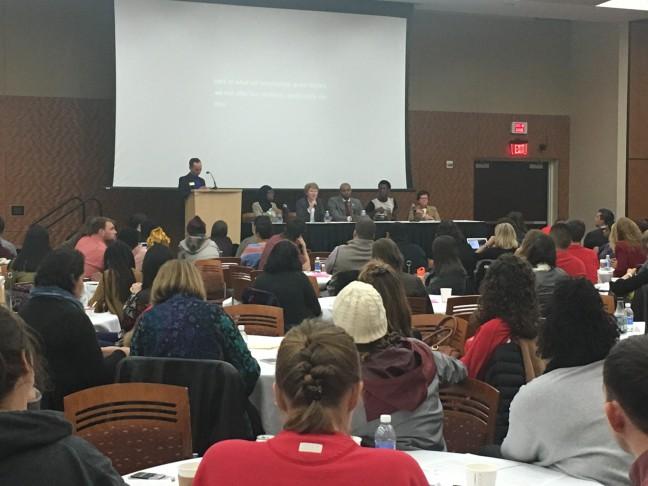University of Wisconsin administration and students tackled tough questions regarding race and diversity Wednesday in an effort to create a plan that could fuel changes to campus culture.
More than 400 people came together in an open discussion on diversity issues, possible solutions to incidents of hate and bias, increasing retention rates and cultural competency.
Dean of Students Lori Berquam said the discussion session was meant to create a safe place for conversation about bias and incidents of hate on campus, whether they be intentional or unintentional.
Berquam said it is up to everyone to come forward and address these issues — not just faculty and staff, or students of color who may be affected by them.
UW Chancellor Rebecca Blank addressed faculty and students emphasizing the necessity to confront these issues. She said while the problem of inclusivity is not exclusive to UW, it is a major issue that must be addressed.
https://twitter.com/BeckyBlank/status/702657162464464897
Blank said since many of the issues UW faces, like stereotypes and cultural competency, are subtle, and can be difficult to solve.
“I can guarantee you that no one plan, no one framework, no one conversation is going to solve the problems, but by saying that we value diversity and that campus climate matters at UW-Madison, we place ourself on the threshold that Dr. King described, ready to take part in a process of change and growth,” Blank said.
Following a 45-minute round table discussion, a panel consisting of Berquam, Blank, Vice Provost and Chief Diversity Officer Patrick Sims and student diversity leaders Tyriek Mack and Mariam Coker, answered questions from members of the audience.
Questions centered around topics like financial accessibility for working students to increasing the number of advisors for students of color that understand the issues they face.
Mack said the reality is students struggle to pay for their tuition and their other needs. Sometimes they have to make the choice between working and attending class to support themselves, he said.
Coker said UW needs to hire more advisors that can help students facing financial difficulties. Some advisors don’t necessarily understand how students struggle to pay for their next meal or their textbooks, she said.
Students of color on campus feel the burden of taking on issues of racism and diversity, Mack said. He said other students on campus need to be courageous and stand up for their peers of color.
In terms of incentives that would encourage more black and Latino people to attend UW, Blank said the focus should be placed on why any student would choose UW. Completing college is important and people are more likely to finish college if they go to a place with higher retention rates like UW, she said.
“Madison gives you a real opportunity at a high class education that you are going to graduate from, and that, more than anything else, is why people should come here,” Blank said.
Coker said she disagreed with Blank, stating the question should remain why black and Latino people should attend UW, not why all students should attend UW. UW is one of the top-ranked research-based institutes and students of color deserve to come to it, she said.
The issue is not getting more students of color to stay here, but getting more students of color to apply here, Coker said.
Coker said these conversations should continue beyond the forum.
“Have these conversations within your classrooms, have these conversations in your offices,” Coker said. “The people who need to be here are not here. [The faculty] are responsible for creating a safe space for all of your students.”














